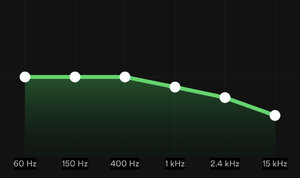- Nov 5, 2022
- 344
- Tinnitus Since
- Mild since 1982 - then Severe Oct 2022
- Cause of Tinnitus
- Microsuction (Oct 2022)
I am really struggling to find the perfect speaker to manage work calls due to damn digital audio sensitivity, like I know many have.
I have so far purchased and returned around six different Bluetooth speakers because in one way or another they were not what I needed.
What I do need is:
So far all of my speakers have gone back (Amazon Echo Studio, Sony SRS-XB13, DOSS SoundBox, Bose SoundLink, Poly Sync 20). I am currently using a Bose SoundLink Revolve II - but haven't tested it fully.
I have returned them all either because connecting to devices was incredibly difficult, the sound quality was too harsh, they would not allow connection to MS Teams and WhatsApp for calls or the inbuilt microphone could not be used for the online MS Teams and WhatsApp calls.
Money is less of a concern at the moment but ideally within $1,000 if possible.
Does anyone have any good suggestions for ideally Bluetooth, but if not, wired speakers, that have helped reduce the tinnitus reactivity when using them compared to cheaper speakers?
I can't avoid work calls, so I need to make the very best I can out of a bad situation - reducing the impact on my ears is the primary goal so I can run wires and add additional microphones to my workstation if an all-in-one solution isn't possible.
I have spent weeks researching but I am not finding anything right now and need some help
I have so far purchased and returned around six different Bluetooth speakers because in one way or another they were not what I needed.
What I do need is:
- High quality to reduce the impact on my ears as much as possible
- Bluetooth functionality ideally - primarily they will be used to connect to a work laptop for MS Teams calls, but I would like them to connect to my Amazon Firestick to see if it is possible to listen to the TV, and also my phone for WhatsApp calls
- The speaker needs to be a speakerphone - so that it has a built in microphone that can be used for calls, as I need to keep the laptops in a different room due to the whirring aggravating my tinnitus
So far all of my speakers have gone back (Amazon Echo Studio, Sony SRS-XB13, DOSS SoundBox, Bose SoundLink, Poly Sync 20). I am currently using a Bose SoundLink Revolve II - but haven't tested it fully.
I have returned them all either because connecting to devices was incredibly difficult, the sound quality was too harsh, they would not allow connection to MS Teams and WhatsApp for calls or the inbuilt microphone could not be used for the online MS Teams and WhatsApp calls.
Money is less of a concern at the moment but ideally within $1,000 if possible.
Does anyone have any good suggestions for ideally Bluetooth, but if not, wired speakers, that have helped reduce the tinnitus reactivity when using them compared to cheaper speakers?
I can't avoid work calls, so I need to make the very best I can out of a bad situation - reducing the impact on my ears is the primary goal so I can run wires and add additional microphones to my workstation if an all-in-one solution isn't possible.
I have spent weeks researching but I am not finding anything right now and need some help


 Member
Member